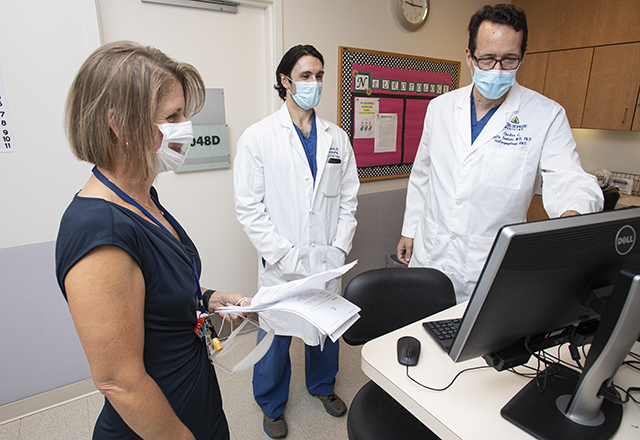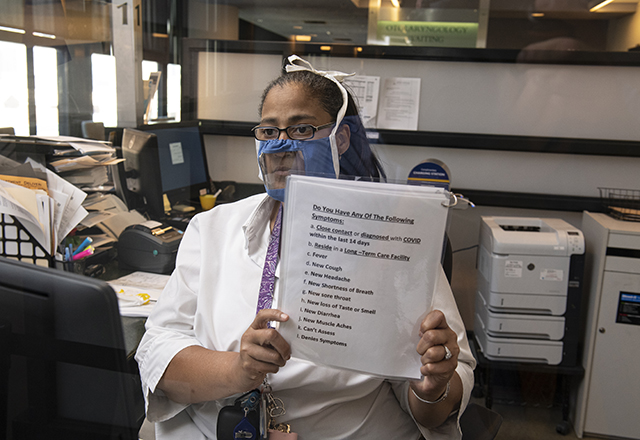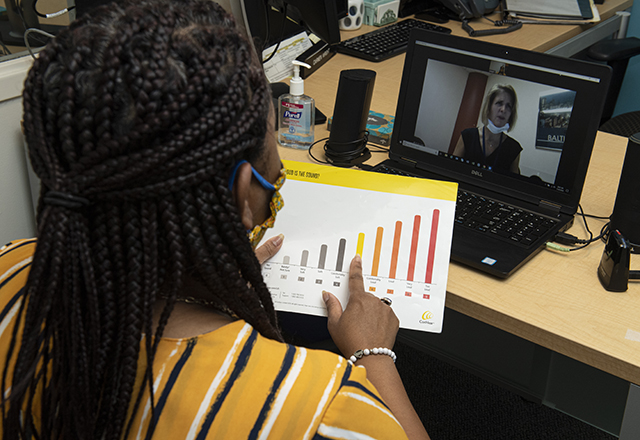 The medical team uses a variety of masks, including clear masks.
The medical team uses a variety of masks, including clear masks. The coronavirus pandemic presents special challenges to people living with deafness or hearing problems.
“Hearing problems can isolate people and keep them out of the loop in conversations with friends and family members. Stay-at-home orders and masks make it even harder for them to communicate with their loved ones,” explains audiologist Dawn Marsiglia, Au.D.
Hearing problems aren’t on hold during the pandemic, Marsiglia explains, and patients shouldn’t hesitate to ask for help if they need it. “It’s especially important to contact us if you have a sudden change in your hearing or a malfunction of your hearing aids or cochlear implant,” she says.
All three Johns Hopkins Cochlear Implant Center and Johns Hopkins Audiology locations (Johns Hopkins Outpatient Center and Johns Hopkins Health Care and Surgery Centers located at Green Spring Station and Bethesda) are open. Whether you are a new or returning patient, you can feel confident in the safety guidelines all locations have in place, including special adaptations that make visits easier for those with hearing difficulties.

What Cochlear Implant Center Patients Can Expect During the COVID-19 Pandemic
The Cochlear Implant Center has undergone major changes to ensure your hearing exams and therapies can continue safely. Marsiglia says that the center’s otologists, audiologists, speech-language pathologists and other professionals are ready to see patients, and have some new procedures in place.
“The Cochlear Implant Center is following all Johns Hopkins guidelines for keeping patients safe during the COVID-19 pandemic,” she says, “including masks, plexiglass partitions, physical distancing and careful cleaning and disinfection of all patient areas.” She adds that the centers can arrange for curbside pickup and return for device repairs.
For appointments to adjust a hearing aid or cochlear implant, Marsiglia says that new technology enables remote programming. “Some hearing aids can be reprogrammed from the patient’s cellphone. We can also program cochlear implants remotely, with the audiologist and the patient in two different rooms to provide distancing during longer appointments.”
Patients with in-person appointments will find added safety measures starting at the door. “When patients arrive at the center, they will be screened before entering. We screen all patients, doctors and visitors before they enter any Johns Hopkins facility. Patients 18 and older are asked to arrive alone, but children under 18 can be accompanied by one adult.”
Special “Hacks” for Those with Hearing Challenges

Transparent Masks
Face masks can create problems for those who do not hear well. “Masks muffle speech sounds and decrease speech volume,” Marsiglia says. “They also cover up facial expressions and body language that people with hearing problems rely on to communicate.”
When patients arrive at the Cochlear Implant Center, they can see smiles — and read lips. Care providers wear transparent masks that make it easier for them to communicate with patients.

Written Directions
Navigating a health care visit can be a challenge to those who cannot hear well, especially with new COVID-19 precautions in place. The Cochlear Implant Center makes it easier with clearly written directions that guide patients through the process.
“We hope using written instruction cards to guide patients through the check-in process will help them feel at ease and know what to do,” Marsiglia says.
Speech-to-Text Apps
While consulting with their practitioner, patients may be able to use smartphone apps that translate their caregiver’s speech into readable text. Marsiglia says that recent advancements in technology have yielded more options than ever for people with hearing differences.
“There are lots of speech-to-text apps that help patients read what we’re saying to them during longer conversations. We try to provide patients with a list of what’s available, and in some cases, we can demonstrate the app for them.
“People don’t always know what tools are available, but that’s all we think about here,” she says.

Telemedicine: Flexible Options for Cochlear Implant Center Patients
Although the Cochlear Implant Center locations are all open and accepting in-person appointments, telemedicine adds flexibility for patients scheduling routine follow-ups or consultations.
Before the pandemic, Marsiglia notes, the center’s specialists were exploring the option of offering video visits, but the coronavirus outbreak made it a sudden necessity. The team pulled together quickly and worked hard to adapt their offices and processes.
“Telemedicine is now part of our program. If patients don’t have to come in, we’re happy to treat them at home for things such as consult visits, troubleshooting and rehabilitation therapy,” she says.
Some patients adapt to telehealth more easily than others. Marsiglia notes that people with hearing problems might need extra help communicating by phone or over computer conferencing platforms, especially patients to whom the technologies are less familiar.
She observes that in the case of children in speech-language therapy, parents can learn the exercises and work very successfully with their children at home. “Some of the parents have learned the therapeutic steps so well online that they are coaching their kids and helping them make terrific progress.”
She also sees telemedicine as an advantage to patients who live far away. “We didn’t have an immediate need to make it work until COVID-19,” she says. “Now we understand its role and how it can extend our outreach, throughout the pandemic and beyond.”
The challenges of the COVID-19 pandemic make Marsiglia and her colleagues all the more committed to helping patients keep up with their hearing care. “We want to ensure our patients’ hearing is as good as it can be during this pandemic so that untreated hearing problems don’t compound their sense of isolation,” she says.
“Optimizing your hearing is essential to your quality of life, and we’re here to help you do that. We are here for you, and will work with you in whatever capacity you’re comfortable with to make sure your care happens.”